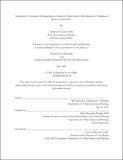‘Autogestión’: Community-led Squatting as a Means of Transformative Revitalization of Abandoned Spaces in Puerto Rico
Author(s)
Zayas del Rio, Gabriela B.
DownloadThesis PDF (6.378Mb)
Advisor
Wendel, Delia Duong Ba
Terms of use
Metadata
Show full item recordAbstract
This thesis documents and reflects on the emergence of a new form of squatting led by collectives in urban communities across Puerto Rico. This new form of squatting is using squatting beyond a means of survival and more substantively as a planning practice. This thesis relies on a mix of ethnographic methods (semi-structured interviews, participant observation, and policy analysis) to understand the context in which these collectives emerge, how one collective is doing such work, and what recommendations could transform planning practice to better support this work. The first part of this thesis sets the context and argues that these collectives emerge to respond to a polycrisis that has produced abandoned spaces resulting from economic development and planning approaches (incentive-based models and imported development models such as suburbanization and urban renewal) that are extractive, colonizing, and devoid of Puerto Rican voices.
The thesis then follows a case study of one collective, Urbe Apié, in Caguas, Puerto Rico. Urbe Apié is a horizontal and decentralized organization that uses a planning area, not just a building, to turn squatting into a comprehensive form of community-led revitalization. Its approach to spatial planning is flexible, embracing uses that shift with time and with changing community needs and aspirations. Most importantly, it repurposes abandoned spaces to materialize collective ownership of the decisionmaking process of city-making, ultimately subverting orthodox notions of private property rights and top-down planning. Its planning approaches have proven to be better equipped for planning in crisis, as they foment deep democracy and multiple sovereignties that empower communities to exercise their self-determination and ensure their permanency in urban centers despite the polycrisis and an increasingly absent government.
The thesis concludes with a set of recommendations for planning to adopt more liberatory practices that support and legitimize these collectives’ work. These include examples on how to decolonize planning tools, such as eminent domain and for-profit revitalization, to remove legal barriers and provide formal avenues for collectives to do this work, which is finally reflecting Puerto Rican voices and not outside and fleeting interests.
Date issued
2021-06Department
Massachusetts Institute of Technology. Department of Urban Studies and PlanningPublisher
Massachusetts Institute of Technology